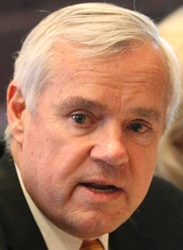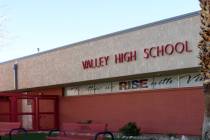Legislators question higher education funding formula
The proposal to remake how the state's colleges and universities are funded would reward innovation, efficiency and success instead of growth, the state's higher education chancellor told a legislative committee Wednesday.
But the proposal, put forth by Chancellor Dan Klaich, would also treat an F grade the same as an A grade, would fund courses at universities and community colleges at the same level, and would so sharply cut the budgets of small, rural colleges that they could struggle to remain open at all.
"I would have a hard time supporting something that included failure as a completion and success," said Sen. Ben Kieckhefer, R-Reno, a member of the Legislature's Committee to Study the Funding of Higher Education.
The committee is studying how to rewrite the funding formula used to divide the tax money provided to the state higher education system every two years.
Since 1989, a formula that heavily relies on enrollment and growth has been in place. The formula has been dubbed confusing and outdated.
Klaich has proposed a new formula that would fund the institutions based on several criteria, including what are called "completions," essentially students finishing a class successfully.
It would not matter what grade the student received.
Klaich said that this was an essential strategy against what is known as grade inflation. If an F grade were not counted as a completion, it could cause a teacher to refrain from giving out F grades, reasoning that his or her institution would lose money for every F given.
"I'm very nervous about essentially eliminating the possibility of failing a course," Klaich said.
The new formula would allow the colleges and universities to keep the student tuition and fees collected at each campus, which is what is done in many states. It would be a massive shift in budgeting. Currently, that money is pooled together and subtracted from whatever tax money is provided to the system.
Such an approach provides little incentive to the institutions to recruit students from out of state. Those students pay much more than Nevada residents.
UNLV's leaders have said they "lose" as much as $17 million a year in out of state tuition because it ends up being split between the rest of the institutions.
UNLV would stand to gain under the new proposal, but other institutions could lose money.
As it stands now - and Klaich said repeatedly that the proposal was a work in progress - the new formula would shift about $13 million from the institutions in Northern Nevada to those in Southern Nevada, where the majority of the students are.
But that would cut the budgets of the rural community colleges by as much as 30 percent, even with an offset that is supposed to help small institutions. Klaich said the new plan would be phased in over several years to help lessen the blow.
The proposal to fund courses at the same level no matter which institution they are taught in brought several questions from legislators.
Committee Chairman Sen. Steven Horsford, D-Las Vegas, called that a "one size fits all" approach.
"You might be right," Klaich said, though he went on to defend the approach, noting that although state tax money provided for an English 101 course would be the same at the various institutions, tuition is higher at the universities, where professors make more money.
The new proposal would include a component to fund research at the two universities. But it is based on funneling more money to graduate-level courses, not necessarily to research.
Kieckhefer wondered why.
Klaich explained that to fund based solely on the amount of research done would favor the University of Nevada, Reno, over UNLV because UNR, the older of the two universities, has a more established research base.
The committee did not act on the proposal but voted to establish two subcommittees to review the overall higher education funding picture in Nevada.
Contact reporter Richard Lake at rlake@reviewjournal .com or 702-383-0307.






















